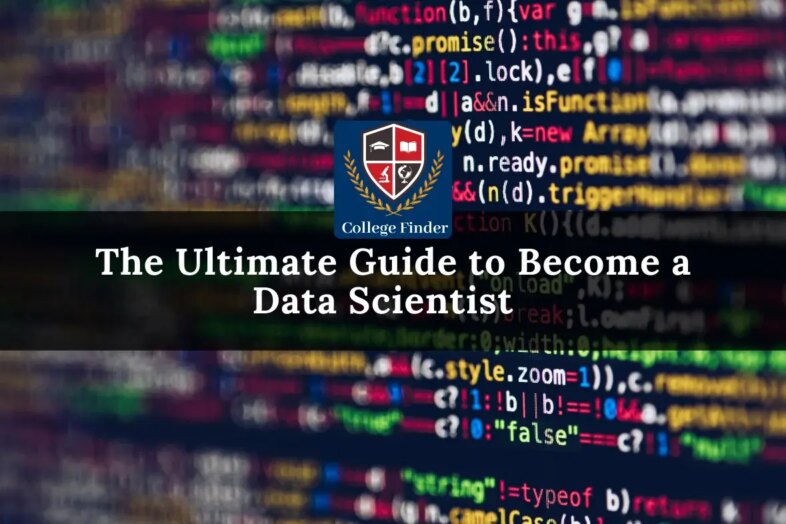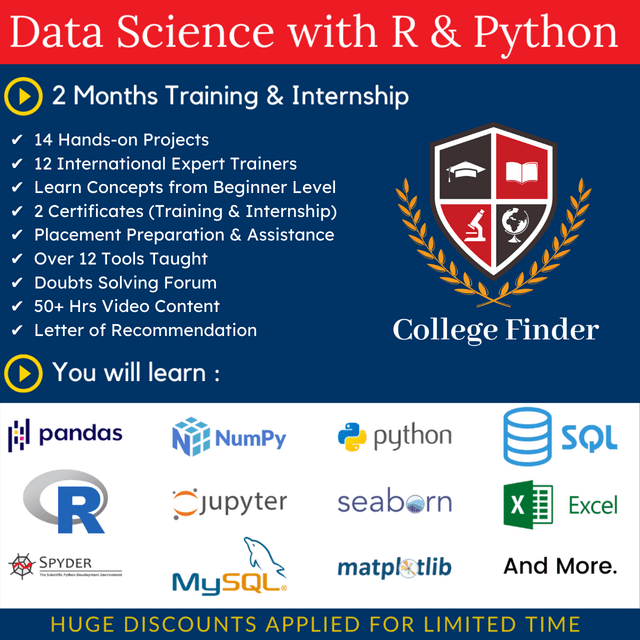
- August 9, 2021
- 1177
- News and Articles
Overview
Your huge horn-rimmed glasses and geeky demeanour could indicate a vital professional path: data science. You should think about becoming a data scientist because of how data is transforming the world.
However, you must first discover how to obtain the appropriate data science courses and programs to be prepared for profitable data science careers.
Data Science has been one of the hottest careers in the globe since the beginning of the twenty-first century. Data scientists earn a lot of money and have a lot of work opportunities. Every day, the globe generates more data, which Data Scientists must collect and analyze for numerous productive purposes.
As a result, we’ll show you how to become a data scientist in this post. You’ll learn what types of academic programs and degrees you’ll need to become a data scientist, as well as how much it will cost you. We’ll also go over the kind of professions you can earn with your degree and answer any questions you have about the subject.
What is Data Science?
Data scientists are from the disciplinary field of data science. It’s an interdisciplinary field that teaches people how to extract knowledge and insights from organized and unstructured data.
Data science is an interdisciplinary field that draws expertise from Mathematics, Statistics, Computer Science, and Information Science. It incorporates statistics, data analytics, and machine learning, as well as the methods for comprehending and analyzing data that go along with them.
Data science has become difficult to distinguish from business analytics, business intelligence, predictive models, and statistics as a result of its strong interaction with these other fields. People (both pros and amateurs) are now interchangeably utilizing these terms.
Because the concepts of data mining and big data are similar, some colleges will market their data science programs like Big Data. So, data science is concerned with the study of large amounts of data utilizing computer programming and virtual mining techniques.
Who is a data scientist?
A data scientist is merely a Data Science tool. What do you think about this? That’s not pleasant enough. So, let’s look at it from a human perspective.
A data scientist is a specialist who collects and analyzes data in order to give a solution using his multidisciplinary skills. As a result, to tackle difficult problems, he or she must have statistical knowledge and computer skills.
In addition, the data scientist will address some of the most analytically complex business challenges using mathematical and algorithmic methodologies. As a result, the data scientist is a valuable asset for huge corporations and those trying to expand their operations.
A data scientist’s main job is to extract meaning from both structured and unstructured data that his company gets. As a result, you’ll watch a data scientist gather data from a database, prepare it for various analyses, design a statistical model, and test or make reports that management can comprehend using data visualizations.
What qualifications should a data scientist have?
It’s not enough to know what data scientists do daily or have the necessary training (which we mentioned) CDL Super Session. You may not be able to excel in this field unless you have some specialized talents.
So, what are the abilities you’ll need?
They are as follows:
1. Computer program and language knowledge and fluency. SAS, SPSS, MATLAB R, Python, Java, C/C++, Hadoop Platform, SQL/NoSQL Databases are all required skills.
2. Business know-how or savvy. Because you’ll be working in a variety of business settings, you’ll need to learn more than just basic business skills. This aids you in resolving complex issues and developing solutions that are in line with your company’s objectives.
3. Ability to communicate. You certainly understand how to work with data, but others will rely on you to convey your discoveries and solutions to them in a language they can comprehend. You must be able to communicate your technical results and analysis to your organization’s non-technical departments.
4. Technical proficiency. Math, statistics, machine learning, data mining, data cleansing, data visualization, and unstructured data techniques should all be at the top of your game.
Which companies employ Data Scientists?
Any workspace that uses data to operate — that is, any organization that wants to expand – employs data scientists. They are more concentrated, however, in businesses with marketing departments and industries such as the auto industry and insurance.
The Ministry of Defense is another workplace where data scientists can be found. They assist in analyzing the threat levels that are approaching a country.
Can a data scientist also work in other fields?
Because of the interdependence of data science, data scientists can work in a variety of industries. This is especially true if you pursue a Master’s degree in Data Science or a related discipline to further your career.
Data Scientists can do a variety of duties, including the following:
1. Data Scientist
Data engineers create software by analyzing vast amounts of data. They usually provide the architecture that enables data scientists to do their jobs successfully. They also manage database systems, expand data architecture across several servers, and develop complex queries to search through the data. As a result, they are comfortable with programming languages like Python, Hadoop-based technologies like MapReduce, and database technologies like MySQL.
2. Data Analyst
Professionals that use data to develop reports and visualizations that better explain data insights are known as data analysts. Data analysts, for example, use graphs to help the organization they work for grasp certain questions. Data analysts are best viewed as the younger brother of data scientists. The scientist’s foundation is built on their knowledge.
3. Engineer in Machine Learning
Machine learning engineers use programming languages like Python or C/C++ to create, launch, and manage machine learning projects. To begin their careers, these experts may need to have a background in software engineering and subsequently obtain expertise in statistics and machine learning.
4. Computer and information science researcher
Computer scientists generate new and improved applications for existing technology as well as designing new computer technologies. They can be found working for countries’ federal governments and in computer system design firms.
How much do data scientists make and what are their career prospects?
All you have to do is ask an honest data scientist to be excited about their pay. However, since you might not have one, we’ll tell you how much they make.
Computer and information research scientists earn an average of $118,370 per year, according to the Bureau of Labor Statistics (BLS). We are aware that this position is distinct from that of a Data Scientist. Both, however, are in the same field and are very closely linked, and BLS recognizes them.
Meanwhile, there were 31,700 openings for Computer and Information Research Scientists in 2018. From 2018 to 2028, the number of jobs is expected to rise by 16 per cent, which is substantially faster than the national average.
Another related job, mathematicians and statisticians, has a pay and job growth listed by the BLS. According to the Bureau of Labor Statistics, mathematicians and Statisticians make an average of $88,190 per year, with a projected growth rate of 30%.
Fortunately, up to and including Glassdoor, we have a more detailed wage for Data Scientists. Data Scientists earn an average of $120,495 per year, according to Glassdoor. For computer and information research scientists, this expectation is significantly greater than the BLS estimate.
What do data scientists need to know in terms of education?
A minimum of four years of undergraduate education from an approved college is required to start a career as a data scientist. The B.Tech in Data Science is the most popular undergraduate degree. Fortunately, a Data Science degree is available at select universities in the United States.
If you are unable to obtain a bachelor’s degree in Data Science. It is sufficient to have a diploma in a related field. Computer science, statistics, physics, social sciences, mathematics, applied mathematics, and economics are some of the disciplines that qualify you for a job in data science.
Following your B.Tech, you’ll need to get a master’s degree in Data Science. Most businesses favour master’s students over bachelor’s students, thus the master’s degree is important. In addition, the proportion of professionals with a master’s degree in the subject is higher than that of professionals with a bachelor’s degree.
You can pursue a PhD in data science after earning your master’s degree. This is great, though, if you want to work in the sector as a leader or teach at a higher education institution.
A four-year baccalaureate degree in Data Science or a similar technical subject is the minimal educational need to become a data scientist. In the interim, you should get a master’s degree in data science to improve your chances of landing a job as a data scientist. If you want to be a leader in the field, you’ll need a PhD to get there.
Can you tell me where I can acquire the best data science education?
While a bachelor’s degree is the minimal prerequisite for employment in the field of data science, we will focus on master’s programs.
This is for obvious reasons. Master’s students have greater opportunities in data science than bachelor’s students.
Consider accreditation, program structure, cost, financial aid, and emphasis if you’re contemplating obtaining a master’s degree in data science.
The Accreditation Board for Engineering and Technology (ABET) may accredit a data science master’s degree, however, this isn’t that important. The school is good to go as long as it has institutional accreditation.
Can you tell me how much it costs to become a data scientist?
It is highly costly to train as a data scientist. With such lucrative compensation, don’t expect education to be inexpensive; otherwise, everyone would be a data scientist.
So, assuming you need a bachelor’s degree in Data Science, a public school bachelor’s degree in Data Science costs an average of $40,940 per year. Tuition, board and accommodation, books and supplies, transportation, and other expenditures are all included in this price.
In the United States, private four-year institutions cost on average around $50,900.
You paid $163,760 for your undergraduate degree at a public university and $203,600 at a private university over four years.
Meanwhile, according to a review of our top schools, a master’s in data science (online and on-campus) costs between $25,750 and $55,952. The sum of these figures equals $40,851 during the program.
As a result, a data scientist degree in a public or private college should cost between $204,611 and $244,451, respectively.
A Guide to Landing a Data Science Job
Remember when getting a job was one of the requirements for becoming a data scientist? Yes, it is critical to get started and obtain valuable professional experience. However, finding work, especially as a recent graduate, might be tough.
So, here are some pointers to help you in your job search:
1. Create a solid portfolio. This is critical for landing a job in data science. You must have relevant experience that will contribute to your educational qualification to establish a portfolio.
2. Once you’ve finished all of your projects, highlight the best ones while concentrating on the bigger ones.
3. Enlist the help of a mentor. It is critical to have a mentor. This is a method of networking in which you, as a mentor with years of business knowledge, can tell you exactly what employers are searching for.
4. Attend meetings and conferences. Still attends conferences to develop relationships that will make it easier for you to break into the field. Attend data science conferences if you can. The Strata Data Conference, KDD (Knowledge Discovery in Data Mining), and The International Conference on Machine Learning are all worth attending (ICML). Meetup.com, SF Data Mining, and Data Science DC are also worth looking into.
5. Use task boards to organize your work. You must hunt for work, and while gatherings will most likely expose you to job openings firsthand, job boards are still necessary. Consider Kaggle, Datajobs, and Data Science Central for job postings.
6. Get a good score in the Data Science Interview. The phone screen, take-home assignment, hiring manager calls, on-site hiring manager interview, on-site interview – technical challenge, and on-site interview with an executive make up the data science interview. Prepare thoroughly for each stage and interview baiting.
Conclusion
Data scientists are the highest earners in the country, with an average yearly pay of $120,495. However, the cost of a data science degree is comparable to that of any other profession. A bachelor’s and master’s degree (about the primary degree you’ll need) costs an average of $204,611 to become a data scientist.
As a result, you should choose an affordable data science degree when pursuing a career as a data scientist. We hope that this article will assist you in your pursuit of a profession in reward data science.









Add Comment
You must be logged in to post a comment.